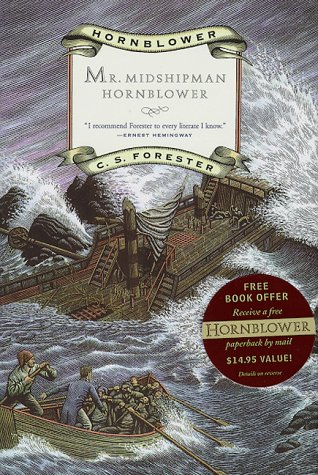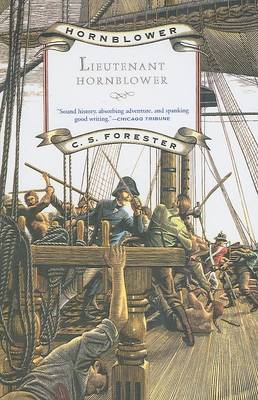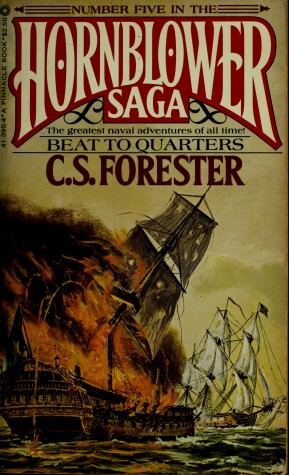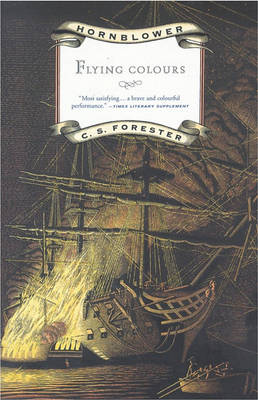Hornblower Saga
11 primary works • 13 total works
Book 1
Book 2
Book 3
Book 4
Although unfinished at the time of C. S. Forester's death, Hornblower During the Crisis delivers a full measure of action at sea, the hallmark of this incomparably exciting series of historical adventures.
On the threshold of securing his first post as captain, Hornblower finds himself forced by the exigencies of war to fight alongside a man whom he has unintentionally helped to court-martial. And for the first time Hornblower assents to engaging in espionage in his efforts to bring victory and glory to England in the Napoleonic Wars.
This extant fragment of Forester's final Hornblower novel is followed by the author's notes regarding the novel's conclusion. Also included in this volume are two stories -- "Hornblower's Temptation" and "The Last Encounter" -- that depict the great sea dog Hornblower in his youth and old age, respectively.
Book 5
Book 6
June 1808, somewhere west of Nicaragua -- a site suitable for spectacular sea battles. The Admiralty has ordered Captain Horatio Hornblower, now in command of the thirty-six-gun HMS Lydia, to form an alliance against the Spanish colonial government with an insane Spanish landowner; to find a water route across the Central American isthmus; and "to take, sink, burn or destroy" the fifty-gun Spanish ship of the line Natividad or face court-martial. A daunting enough set of orders -- even if the happily married captain were not woefully distracted by the passenger he is obliged to take on in Panama: Lady Barbara Wellesley.
Book 7
May 1810, seventeen years deep into the Napoleonic Wars. Captain Horatio Hornblower is newly in command of his first ship of the line, the seventy-four-gun HMS Sutherland, which he deems "the ugliest and least desirable two-decker in the Navy List." Moreover, she is 250 men short of a full crew, so Hornblower must enlist and train "poachers, bigamists, sheepstealers," and other landlubbers.
By the time the Sutherland reaches the blockaded Catalonian coast of Spain, the crew is capable of staging five astonishing solo raids against the French. But the grisly prospect of defeat and capture looms for both captain and crew as the Sutherland single-handedly takes on four French ships.
"A fine sea tale, to be ranked with the best of its kind." --New York Times
Book 8
Book 10
Book 11
In the chaotic aftermath of the Napoleonic Wars, the legendary Rear Admiral Lord Hornblower struggles to impose order. Serving as commander-in-chief of His Majesty's ships and vessels in the West Indies, Hornblower confronts a formidable array of hostile forces. The war is over, but peaceful it is not.
"A rattling good story." --New York Times
Book 11
A Horatio Hornblower Tale of the Sea
1815, the Napoleonic Wars are over. Yet peace continues to elude Horatio Hornblower overseas . . .
As an admiral struggling to impose order in the chaotic aftermath of the French wars, Horatio Hornblower, Commander-in-chief of His Majesty's ships and vessels in the West Indies, must still face savage pirates, reckless revolutionaries and a violent hurricane.
And while his retirement at half-pay might well be in sight, Hornblower will need every ounce of his rapier wit and quick thinking - not to mention his courage and leadership - to ensure that the lasting peace in Europe reaches the turbulent seas of the West Indies.
This is the tenth of eleven books chronicling the adventures of C. S. Forester's inimitable nautical hero, Horatio Hornblower.
'The true master of the genre' Boris Johnson
The year is 1812. Hornblower has been ordered to do everything possible, diplomatically and militarily, to protect the Baltic trade and to stop the spread of Napoleon's empire into Sweden and Russia. Though he has set sail a hero, one misstep may ruin his chances of every becoming an admiral.
Hornblower must find his way through a maze of perils -- hostile armies, seductive Russian royalty, ice-bound waterways, assassins in the imperial palace -- before he can return home to his beloved new wife and son, as his instructions are to sacrifice every man and ship under his command rather than surrender ground to Napoleon.
"Hornblower is Hamlet in command of a battleship." --New York Times








